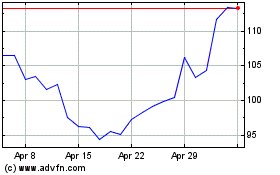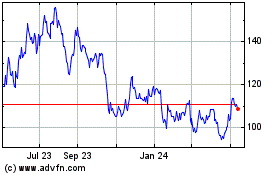China Launches Baidu Probe After the Death of a Student
May 02 2016 - 2:30PM
Dow Jones News
BEIJING—China's government is launching an investigation into
Internet search giant Baidu Inc. following the death of a young man
with cancer who had taken a therapy found through an online
advertisement.
The Cyberspace Administration of China announced Monday that it
is joining with the national health commission and another agency
to investigate the "Wei Zexi incident." In doing so, the
administration noted that Mr. Wei's death last month "drew
widespread attention" from Internet users.
Mr. Wei, a 21-year-old college student, suffered from a rare
cancer called synovial sarcoma that affects tissue around major
joints.
After he received radiation and chemotherapy, his family sought
alternative treatments and found via Baidu a 200,000 yuan ($31,000)
therapy at a Beijing hospital that proved ineffective, according to
statement from the family released through the financial news
magazine Caixin on Sunday.
In a statement, a Baidu spokeswoman said the company regrets Mr.
Wei's death, will cooperate with the investigation and is committed
to providing "a safe and trustworthy search experience for our
users." Baidu "will give no quarter to fake information or illegal
activities online," the statement said.
Mr. Wei's death was the second time this year that Baidu has
come under fire for its handling of the balance between profits
from advertising and the responsibility to its users regarding
medical information.
Baidu is China's dominant search engine, with a market share of
about 80%, and many Chinese turn to it to look up medical
advice.
Like other search companies, Baidu earns a large portion of its
revenue from selling ads. In the first quarter of this year, online
ads comprised about 94% of Baidu's revenue.
In an earnings call on Friday, chief financial officer Jennifer
Li told analysts that medical care was one of the company's top
sectors.
In January, Baidu faced online fury after it sold the management
rights to a bulletin-board platform for patients with hemophilia to
a company that Internet users said populated the site with
questionable information.
The Internet regulator criticized Baidu, which acknowledged its
mistakes and said it would stop trying to make money from patient
forums.
In Mr. Wei's case, criticism from Baidu is coming from some of
largest, most influential state-media companies.
The government's news agency, Xinhua, accused Baidu in a
commentary on Monday of abusing search technology to sell out its
users for profit.
"Making money by allowing companies to pay for better search
placement is to put a good tool in the hands of interest-seekers
with bad intentions," it said.
In their statement, Mr. Wei's parents said they aren't seeking
compensation and don't plan to sue. "We harbor no hatred for Baidu
or the hospital," they said.
In the statement, the family said that after Mr. Wei had
undergone several rounds of radiation and chemotherapy, they went
online to research treatments in an effort to keep the cancer from
recurring.
Their search found an immunotherapy treatment offered by the
Beijing Armed Police Corps No. 2 Hospital, which is advertised as
"the world's most advanced," the statement said.
Mr. Wei underwent four treatments at the hospital, but his
family said they "didn't see good results."
Baidu said the company doesn't work with unqualified private
hospitals, and that it has a team that ensures its medical
advertisements comply with Chinese laws.
It added that it has a set of procedures and requirements to
ensure safe advertising.
On Thursday, on its Twitter-like Weibo account, Baidu said the
hospital where Mr. Wei sought treatment is a qualified medical
institution.
Calls to the hospital were unanswered on Monday night.
(END) Dow Jones Newswires
May 02, 2016 14:15 ET (18:15 GMT)
Copyright (c) 2016 Dow Jones & Company, Inc.
Baidu (NASDAQ:BIDU)
Historical Stock Chart
From Mar 2024 to Apr 2024

Baidu (NASDAQ:BIDU)
Historical Stock Chart
From Apr 2023 to Apr 2024
